The Fall Of The Berlin Wall, Thirty Years Later
Thirty years ago today, history took off in a brand new direction.
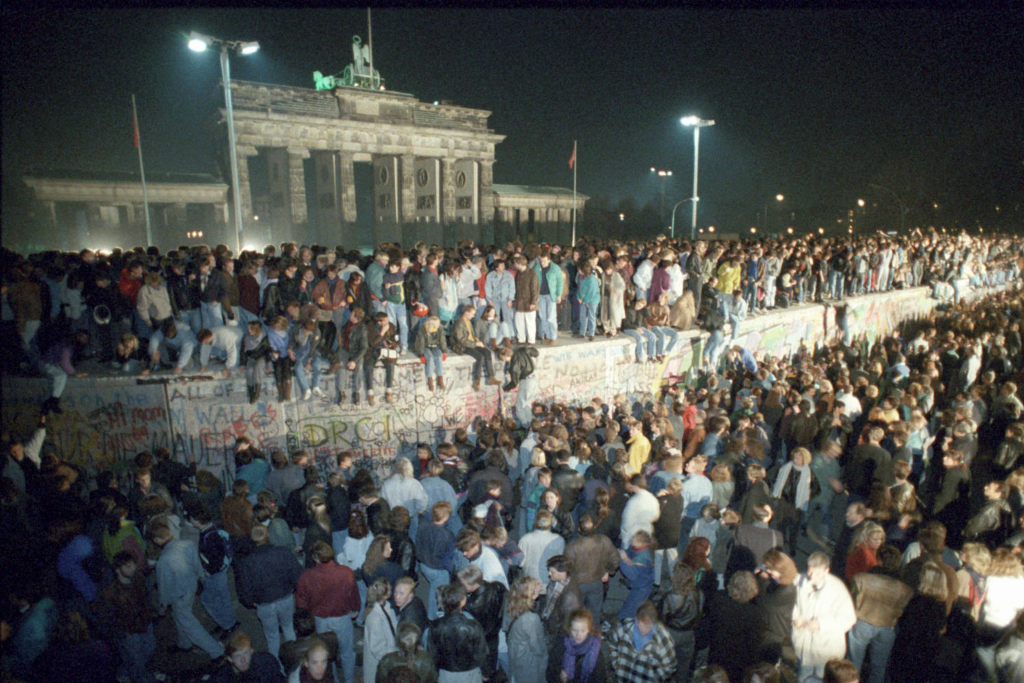
Thirty years ago today, history took off on one of its occasional tangents and set in course a series of events that led to the end of the Cold War, the fall of the Soviet Union, a Europe with a completely redrawn map, and a new world that we still haven’t quite figured out:
Günter Schabowski scratches his head, puts on his glasses, hesitates, then fumbles with his handwritten notes.
He seems to be trying to understand what he is reading and haltingly responds to a question about when a measure giving East Germans more freedom to travel would take effect: “As far as I know… as of now.”
History’s train has left the station. It is around 7pm on November 9th, 1989.
A member of the Politburo of East Germany’s communist party, and its spokesman, this member of the inner ruling circle of the “workers’ and peasants’ state”, as the German Democratic Republic was known, just announced to a few flabbergasted journalists the fall of the Berlin Wall.
He seems to do it by accident, at the end of a press conference and in response to questions about the new rules for East German citizens leaving the country.
There was no going back.
(…)
Günter Schabowski is entrusted on the evening of November 9th, 1989 with the mission of announcing live on television the measures decided the same day by a small committee.
From there, the versions of events vary.
Krenz still resents Schabowski, whom he accuses of having plunged the GDR “into a difficult situation” by proclaiming the immediate entry into force of the chance to leave the country.
The fall of the Berlin Wall “was the worst night of my life,” Krenz told the BBC in an interview, something he “wouldn’t want to experience ever again”.
Schabowski should have, according to Krenz, stuck to a press release drawn up announcing the liberalization of travel starting the next morning.
The idea was to allow controlled departures with a mandatory visa and to maintain border infrastructure, not to rip down the Wall overnight, and with it the GDR.
So was it an error of judgement in the line of fire? Or an audacious, intentional move? Until his death in 2015 at 86, Schabowski never clearly answered the question.
“No one could have stopped the movement that was touched off by my announcement,” he would say later, casting himself as an ardent reformer.
According to his version of events, the opening of the borders was pushed through by a vanguard of proponents of change against the wishes of the party’s central committee, dominated by Stalinist die-hards.
“We came to the conclusion that if we wanted to save the GDR, we had to let the people who wanted to flee leave,” Schabowski told the daily TAZ in 2009.
The former East German dissident and later speaker of the Bundestag lower house of parliament, Wolfgang Thierse, however is convinced that Schabowski never grasped the full impact of his announcement.
“I don’t think he knew what was going to happen,” he told public radio.
“We suspected that something was being prepared for freedom of travel because the communist party wanted to lift the lid to decrease the pressure.
But Schabowski did not have an inkling that he was going to set everything off.”
For those who weren’t alive at the time, or who didn’t grow up with the Cold War as a constant reality, it’s hard to explain just how significant and surreal the night of November 9th, 1989 was. The wall itself had been up for 28 years and Berlin, Germany, and Eastern and Western Europe had been divided since the end of World War II. The Cold War had been a reality for more than a generation, and it all basically came to an end on one night in November 1989. Within two years, the Soviet Union itself would be gone, and the world would never be the same.
I can remember staying up that night watch Tom Brokaw’s live coverage of the event. NBC News apparently had the only camera position that gave a full view of the celebration on top of the wall, the crowds in West Berlin urging their cousins to cross over, and the sight of people taking chisels and sledgehammers to the monstrosity that had divided their city since the time that Nikita Kruschev ruled the Soviet Union. It was, in many ways the cap on top of what had already been an extraordinary year.
The process began in Poland, which of course had already seen a popular uprising earlier in the decade that was never quite quelled. From there, protests spread across Eastern Europe into Hungary, Bulgaria, Czechoslovakia, and even the dark recesses of Nicolae Ceaucescu’s Romania. Those protests even inspired a student uprising in China that led to the protests in Tiananmen Square and a showdown that had to be ended under the tracks of tanks and the guns of the People’s Liberation Army. Perhaps horrified by how far the Chinese had been willing to go, and warned by Soviet leader Mikhail Gorbachev, leaders in Eastern Europe ended up being remarkably reticent to use force to put these protests down. Instead, they let the protests continue and, in the case of Hungary and Czechoslovakia, opened their borders to the West and basically allowed anyone who wanted to leave to do so. Among other things, this led many people from neighboring East Germany to travel to these nations in an effort to get out of their own country.
It was inevitable, then, that those protests would come to East Germany itself, and that they would be centered in Berlin, the city that had come to symbolize in stark terms the division of Europe for the previous 44 years. At first, there seemed to be some danger that the East Germans would react in much the same way the Chinese did five months earlier and use violence to put the protests down. Indeed, earlier that year, Erich Honecker, the long-serving hard-line ruler of the GDR, had praised the leaders in Beijing just days after they sent in tanks and troops to bring an end to the protests in Tiananmen Square. By mid-October, though, Soviet leader Mikhail Gorbachev was making clear to Honecker and the leaders of the GDR that Moscow would not support such a crackdown. This eventually led to Honecker stepping down to be replaced by new leadership that apparently hoped to implement Gorbachev-style “glasnost” and “perestroika” as a means of quelling the protests and stabilizing the country. Perhaps that might have worked had they not come to power when they did, instead it was too little, too late. The rest, as they say, is history.
With the events of November 1989 now thirty years in the past, we have now lived in a world where there was no Berlin Wall for a longer period of time than the wall itself existed. There’s an entire generation or more of Americans, Europeans, and Russians that have come into adulthood with no memory of what the Cold War was and what the Berlin Wall represented, and it’s not easy to communicate that through mere words or a display in the museum. It was the physical manifestation of the “Iron Curtain” that Winston Churchill spoke of during his famous speech at Westminster College in Fulton, Missouri in March 1946 and its destruction was the physical manifestation of the changes that had swept through Eastern Europe over the preceding eight months. Once it was down, much of the rest that followed, including the eventual fall of the Soviet Union itself, became inevitable. Thirty years later we can argue over whether or not all the policy decisions that were made in its wake, such as the expansion of NATO to the borders of Russia, were the correct ones, but there’s no denying that the jubilant destruction of the symbol of Soviet oppression that we saw unfold on television was a good thing.

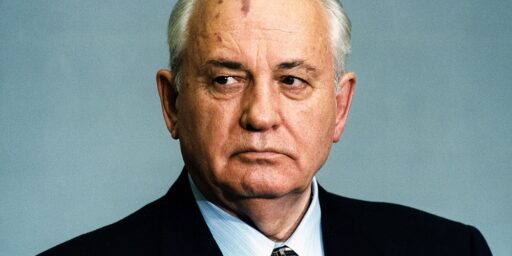
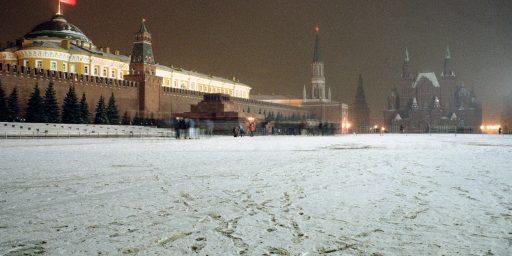

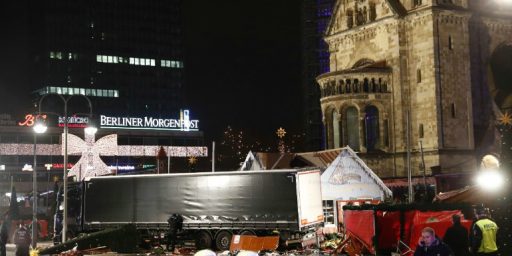
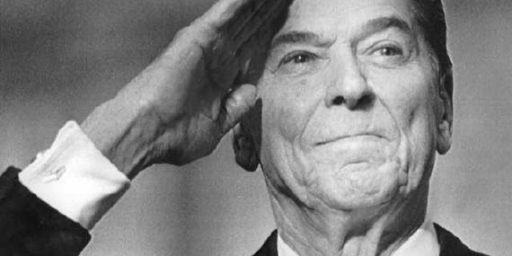
Not long ago, I watched an interview of Herr Schabowski, done a couple years after that wonderful night. The interviewer asked how it came about that he had made this apparent mistake. The light smile that crossed his lips, and the sparkle in his eye, just before he answered said far more than his words. From that moment on I have believed he did it intentionally.
I was sitting in my living room in Fuerth, Germany, a suburb of Nuremberg, on that night I was reading a book–a Tom Clancy novel, as I recall–with the TV running in the background. Suddenly I became aware that the regular program had been interrupted, by the incredible news the Iron Curtain had fallen. I had tears in my eyes–even today, I still do when I think about it.
A friend, who was attached to the US Embassy, was in Berlin that day. He told the story of crossing over when the wall came down and the East German police looking at him an shrugging. 20 years later he was telling some of us this story and he still amazed at what happened around him.
Unlike Kennedy’s assassination, I can’t remember where I was or what I was doing when I heard that the Wall had fallen. I do remember watching a few hours of the coverage at a local and the place enthralled.
It was a very good thing. Two purely good things I’m glad I lived to see: the moon landing and the fall of the wall.
The Soviet Union fell and three decades later the President of the United States – the winner – surrendered control over American foreign policy to Russia – the loser. It makes me think we were lost without a clear enemy. We subbed in Osama bin Laden for a while, but that was always a battle of titan against pipsqueak. Now that the terrorism panic has abated, in our confusion we’ve evidently decided on national suicide.
Mike Pompeo speaking about how walls are cruel is like watching a shark say the sight of blood makes it faint…
“The process began in Poland, which of course had already seen a popular uprising earlier in the decade that was never quite quelled. From there, protests spread across Eastern Europe into Hungary, Bulgaria, Czechoslovakia, and even the dark recesses of Nicolae Ceaucescu’s Romania. (…)”
“It was inevitable, then, that those protests would come to East Germany”
This is a bit nitpicking, but I think that the protests in Checoslovakia, Bulgaria, Romania were after the fall of the wall (and in Hungary the transition was almost without protests); in many ways, East Germany was the second piece to fall (after Poland), and the others began to falling after that.
The fall of the wall marked the end of the Cold War. It was a great victory for us. The desire to impose order from the top is a temptation that leads to the downfall of empires. The USSR just could not hold up. We Americans should avoid trying to shape nations; it will prove too costly in the long run. The German nation was unified in only 1871, and it has had quite a history since then. A history marked with some of the darkest episodes in human experience. Having largely foregone grand ambitions for the last two generations, they have actually achieved more. I’m one of those who thinks that the replacement of Bismarck by Kaiser Wilhelm II led to militarism and adventurism. An alternative history with a peaceful Germany in the early twentieth century would lead to a very different world.
I applaud the Germans for what they have been accomplishing.
A small part of me remembers that November 9 is also Krystallnacht. This coincidence reminds us of the many ironies that create history.
Let’s not mince words: It was a mistake to attempt to expand NATO against Russia’s border, given its history with Germany in both world wars. World War 2, in particular, left Russia with the sense of vulnerability, thus spurring its buildup of a buffer zone made up of the Baltic states and eastern Europe.
What nation wouldn’t be suspicious of such aggressive geopolitical moves against it? I said years ago that Putin would act against such moves. I had no idea of the long-term strategy of weakening the sole hegemon. And it was all too easy, because we are a tribal, bigoted people, as a whole, superstitious and greedy all at once.
Robert Farley at LGM provided a link to a good article in WAPO’s Monkey Cage blog on the effect the end of the Cold War had on US domestic politics, particularly on Republicans. Fighting Communism united us for 40 years, then we pursued a united, peaceful Europe for 25 years, and now we have no clear direction.
When I was a kid, everyone expected the cold war to become a hot one. We took for granted having to practice dropping to the floor and crawling under our school desks in case the Russkis dropped the big one on us. I remember thinking: “The Russians aren’t going to waste an A-bomb on a country school this small,” and, “If they do, how is this plywood desk gonna save me?”
Nobody ever talked about it. We just did it.
Blah, blah, blah. If Russia hadn’t wanted an expanding NATO, it shouldn’t have created its buffer zone from unwilling thralls and eyed them covetously after the fall of the UDSSR. Just ask Georgia, Moldavia, Ukraine or Chechnya how nice it is having Russia as a neighbour without a powerful backup.
NATO didn’t expand to encircle Russia, their delusions nonwithstanding. It expanded because Russia’s neighbours were bloody terrified.
@Ebenezer_Arvigenius:
Yeah, sure, pal. All that chaos in Russia after the fall; the revelation of the true incapacity of the Soviet armed forces; and the economic collapse sure had them quaking in fear. Are you 12? Because you demonstrate a right-wing, parochial view that is centered in that “American exceptionalism” delusion, with no sense of history or the cause-and-effect post-Cold War U.S. foreign policy. But, keep doing you, Boo Boo.
So, totally peripheral to the convo, I take back everything I said about being willing to support a Nikki Haley run at POTUS. In addition to her sanctimonious fellating of Trump, she’s also throwing Tillerson and Kelly under the bus. I’ll gladly take the verbal flogging for being dense and naive, now.
@dennis: “Sanctimonious fellating…” Good one, Dennis. That’s precisely what is it. And it’s sickening.
@Ebenezer_Arvigenius: Yup. Being a buffer state is a bitch. But it may not have been in the NATO states best interest to ease their burden. NATO is a defense pact. Buffer states make defense easier. Turning them into trip wires is dangerous.
Good lord, you’re dense. Firstly, it’s irrelevant if something *is*. It’s enough that people *fear* it. And Poland is *still* trying to get US troops to discourage Russia.
Secondly, given the difference in power levels, it’s irrelevant how disorganized they were. When it’s 1.000.000 against 60k, leadership plays second fiddle (unless you’re Finland :P).
Thirdly, solid finances are not a requirement for conquest. Frequently the reverse. Just ask Germany and France about it.
Mate, I’m not even American. That seems … unlikely.
NATO enlargement (99/02) happened *after* Russia started it’s policy of supporting Russian independence movements in neighbouring states (89-02) and *before* the military downsizing in ’08. So I’m not the one botching history here.
It might have been a bad idea to expand NATO. It might even have been contrary to promises made. But it was a reaction to well-founded concerns in eastern Europe. The left-wing fantasy of a poor, beleaguered Russia just reacting to Western aggression is a typical apologist talking point.
You just can’t argue away the easily perceivable fact that Russia immediately started pushing outward and never really accepted the independence of its former colonies. So their fears were clearly well-founded. The counter-narrative that Russia would have happily stayed a regional power content inside its own borders absent NATO enlargement is patently ridiculous.
In fact you’re the one running under the “American exceptionalism delusion” here. Not everything others do is a pure reaction to US action you know. Russia used to be a world power. They make their own moves.
@gVOR08: Complete agreement here. But that was a weird time. Some stuff is just hard to stay away from.
Objectively, the GDR would have fared much better as an independent state with their own currency. But if something is wanted that much and the want of the recipient aligns perfectly with the self-image of the giver, stupid decisions happen.
Ukraine is an independent nation with a population of 44 million people, most of whom don’t seem willing to be consigned to permanent obedience to Russia, particularly given that Russia is and has pretty much always been a thug state with government by corrupt tyrant. It’s Ukraine’s decision whether it wishes to align with the west.
I understand the Russian obsession with buffer states. After all, Russian incompetence, corruption and oppression allowed the Germans to invade in WW1. Invade countries previously subjugated by the Tsarist regimes, not so much Mother Russia, which stumbled along until the Bolsheviks betrayed the west by surrendering.
In WW2 we all know how the Russians suffered. After having made war on Finland, after having made a treacherous deal with Hitler, after training Hitler’s Gestapo, after Stalin had gutted his own army with purges and been utterly blind to Hitler’s intent, after seizing control of the eastern half of Poland and massacring their officers while blaming it on the Germans.
The Russians need buffer states because they are a brutal, backward and malignant country, the tumor on the side of Europe. They need to subjugate other people in order to avoid the consequences of their own misdeeds. So shut up, Ukrainians, and bend to Moscow’s will.
As to letting Ukraine into NATO, yeah that was premature. Not morally wrong, not strategically wrong in the long term, but premature. We were writing checks we knew would never be cashed, no German or Dane or American was ever going to die for Ukraine, and they were too weak to do much on their own.
So bad move on our part trying to pull a bluff. But let’s be clear on who and what the Russians are.
@Ebenezer_Arvigenius: @Michael Reynolds:
Sure. Didn’t mean to give the impression that Russia is an innocent actor. That said (at the risk of sounding *dense*), it is blind and willful disingenuity to assert Russia wasn’t reacting to counter NATO expansion while attempting a resurgence of super power status. I recognize full well Russia’s malign intent. I also recognize an arrogant and overreaching foreign policy when I see one. That’s not being dense; that’s just practical.
Dude, look at my picture. You REALLY think I’m arguing American exceptionalism here? I’ll concede your point that not everyone reacts to every U.S. action; but Russia (and China, and the EU, for that matter) most certainly, from a Realist politics view, took their individual actions to balance a lone superpower. You’ll find tons of essays arguing the point.
You said Russia used to be a world power: I rest my case.
And don’t call me dense.
Rather touchy for someone who starts discussions with “Yeah, sure, pal … Are you 12?”, hmmm?
@Ebenezer_Arvigenius:
Yup. I’m known to be touchy.
Fair enough.
So you’re saying that Putin wouldn’t have created all the mischief that he has absent NATO expansion?
As the man said, everything Trump touches dies…
@Mikey: There was a passage in my first novel (mercifully unpublished) in which an Army officer in West Berlin was having a nightcap with his wife, unaware of what was happening a few miles away – until a phone call from a former CO in the States clued him in to those remarkable events.
@Michael Reynolds: George Kennan’s 1946 “Long Telegram”, which established our policy of containment, explored whether Russia was aggressively expanding it’s influence because they were spreading International Communism or because it was Russia. The upshot being because it’s Russia and the “instinctive Russian sense of insecurity.” They’re no longer godless commies, now they’re Orthodox capitalists. Now that we can make oil deals (and maybe hotel deals) with them, some of us see them differently. They haven’t changed.
@CSK: I grew up in Seattle, just over the hill from Boeing Plant #1, where the father’s of some of my class mates and men from our church worked. I remember doing an atom bomb drill once during the second or third grade, but I don’t recall ever doing a second and it certainly didn’t become a regular thing for us.
Of course, it may be that being so close to Boeing everybody realized that what we were really going to need was a zombie wars drill, and they didn’t want to start those.
@Just nutha ignint cracker: I was about 30 miles outside of Manhattan. I think people assumed it was the No. 1 target in the western hemisphere.